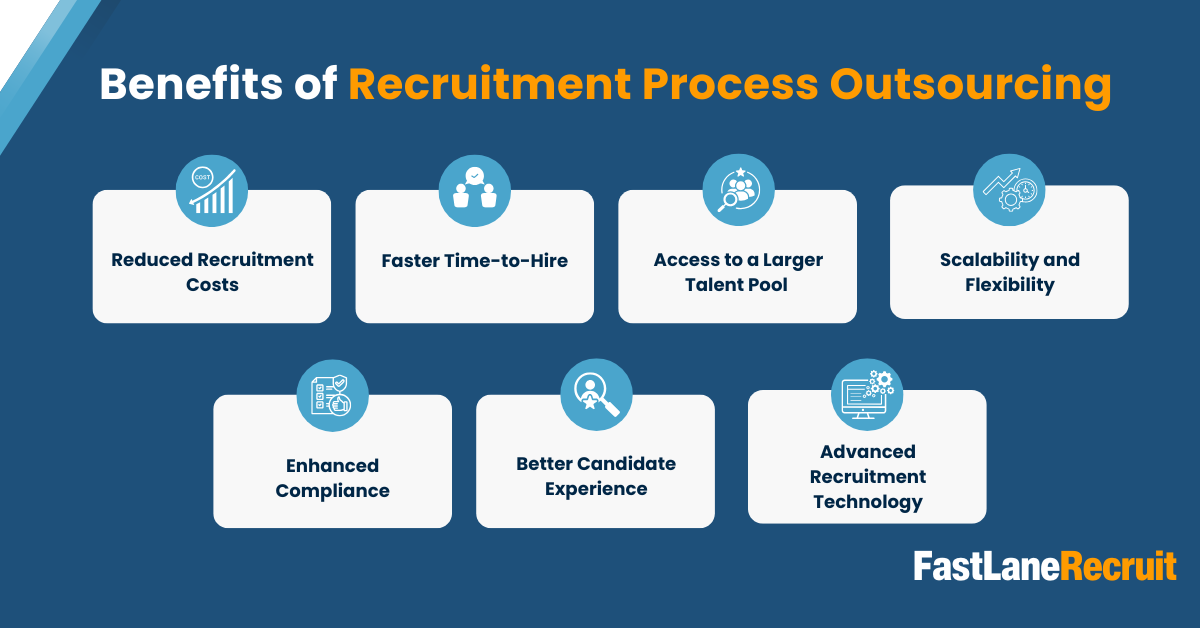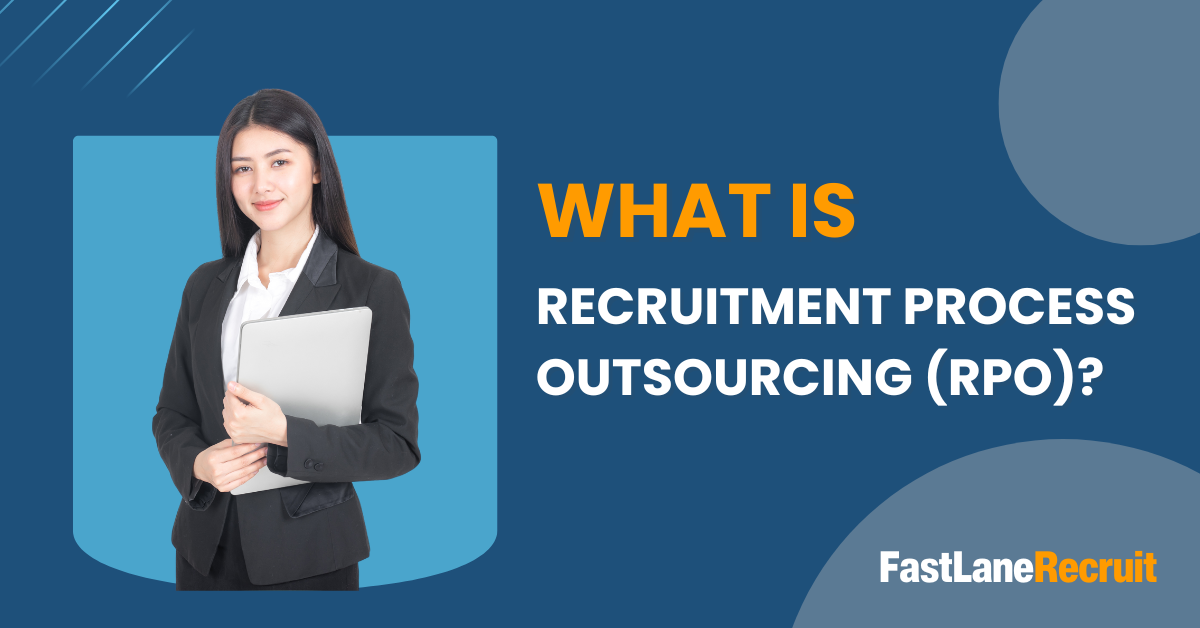Recruitment Process Outsourcing (RPO) is a strategic talent acquisition solution where an organization transfers all or part of its recruitment processes to an external provider. RPO providers take responsibility for sourcing, screening, hiring, and onboarding candidates, ensuring efficiency, scalability, and improved hiring outcomes. Unlike traditional staffing agencies, RPO providers act as an extension of a company’s HR team, bringing expertise, technology, and industry best practices to enhance the recruitment process. By leveraging the expertise of RPO firms, organizations can focus on their core business activities while ensuring they attract top talent.
Content Outline
Key Summary
Recruitment Process Outsourcing (RPO)
is a strategic approach where companies delegate hiring processes to external providers for better efficiency, scalability, and talent quality.
Benefits of RPO
include cost savings, reduced time-to-hire, access to a larger talent pool, and improved compliance.
RPO models
Unlike staffing agencies, RPO providers act as strategic partners and integrate with internal HR teams for long-term hiring solutions.
RPO vs. Staffing Agencies
Australian businesses can navigate Malaysian labor laws and employment regulations with the help of services like FastLaneRecruit, ensuring full compliance.
RPO vs. BPO
RPO focuses exclusively on recruitment, whereas BPO covers various business functions beyond talent acquisition.
FastLaneRecruit provides
tailored RPO solutions to help businesses enhance their hiring strategies with expert-driven, technology-powered recruitment services.
Benefits of Recruitment Process Outsourcing
RPO offers numerous advantages for businesses looking to enhance their hiring processes:
- Reduced Recruitment Costs – By streamlining processes and leveraging economies of scale, RPO reduces the cost-per-hire.
- Faster Time-to-Hire – Efficient sourcing and screening ensure quicker placement of candidates.
- Access to a Larger Talent Pool – RPO providers utilize extensive networks and recruitment technologies to reach top-tier candidates.
- Scalability and Flexibility – RPO solutions adapt to changing business needs, accommodating both rapid hiring surges and slowdowns.
- Enhanced Compliance – Ensuring legal and regulatory compliance in various hiring markets.
- Better Candidate Experience – Structured processes improve communication and engagement with candidates, strengthening employer branding.
- Advanced Recruitment Technology – AI-driven tools, applicant tracking systems, and data analytics enhance hiring efficiency and decision-making.

What Can You Expect from an RPO Partnership?
An RPO partnership provides businesses with a structured and scalable recruitment strategy tailored to their hiring needs. Companies can expect:
- Scalable Solutions – RPO services adapt to business fluctuations, whether scaling up or down.
- Access to Expertise – RPO providers leverage industry best practices and advanced hiring technologies.
- Cost Efficiency – Reducing hiring costs through optimized processes and lower turnover rates.
- Improved Candidate Quality – Enhanced screening and talent matching for better long-term hires.
- Compliance and Risk Mitigation – Ensuring regulatory compliance in various hiring jurisdictions.
- Employer Branding – Strengthening employer reputation with a consistent and structured recruitment process.
RPO Models
RPO solutions come in various models, depending on the organization’s needs.
Full-Cycle RPO
A comprehensive solution where the RPO provider manages the entire recruitment lifecycle, from workforce planning to onboarding. This model is ideal for organizations seeking a fully outsourced talent acquisition function.
Partial RPO
A flexible approach where only specific recruitment processes, such as sourcing or screening, are outsourced. It allows businesses to retain control over key hiring decisions while benefiting from external expertise.
Project RPO & Recruiter On-Demand
Suitable for businesses with short-term hiring needs or sudden recruitment surges. Project RPO handles recruitment for a defined period, while recruiter-on-demand services provide temporary hiring support.
Modular RPO
A customizable solution where companies can outsource selected components of their hiring process, such as candidate sourcing, employer branding, or compliance management.
High-Volume RPO
Designed for businesses with frequent, large-scale hiring needs, such as seasonal recruitment or rapid expansion. It ensures efficiency in handling bulk recruitment while maintaining quality hires.
Why Use RPO?
RPO provides numerous advantages, making it a preferred choice for businesses of all sizes:
- Improved Hiring Quality – Access to highly skilled professionals using data-driven selection techniques.
- Reduced Time-to-Hire – Streamlined recruitment processes ensure faster placements.
- Scalability – Adapts to hiring needs, whether for permanent, contract, or seasonal roles.
- Cost Savings – Reduces recruitment costs through efficiency and economies of scale.
- HR Efficiency – Frees up internal HR teams to focus on core business functions.
- Global Talent Access – Expands recruitment reach beyond local markets.
When to Use RPO?
Businesses should consider RPO when:
- They experience rapid growth and need to scale recruitment quickly.
- Their internal HR teams lack the resources or expertise to handle hiring demands.
- They want to improve hiring efficiency and reduce costs.
- They require high-quality candidates for specialized roles.
- They need to enhance employer branding and candidate experience.
What is the Difference Between Business Process Outsourcing (BPO) and RPO?
| Aspect | Business Process Outsourcing (BPO) | Recruitment Process Outsourcing (RPO) |
| Scope | Covers a broad range of business processes, including IT, customer service, and HR | Focuses exclusively on talent acquisition and recruitment functions |
| Functions Outsourced | Non-core business processes | Hiring, sourcing, screening, and onboarding |
| Objective | Improves efficiency across different business areas | Enhances recruitment effectiveness and talent acquisition |
| Examples | Payroll processing, IT support, call centers | Full-cycle recruitment, high-volume hiring |
What is the Difference Between a Staffing Agency and RPO?
| Aspect | Staffing Agency | Recruitment Process Outsourcing (RPO) |
| Engagement Model | Provides candidates on a transactional basis | Acts as a long-term strategic hiring partner |
| Focus | Fills immediate vacancies | Builds a comprehensive recruitment strategy |
| Customization | Limited customization | Tailored solutions aligned with business goals |
| Technology & Analytics | Minimal use of advanced tools | Utilizes AI-driven recruitment tools and data analytics |
Conclusion
Recruitment Process Outsourcing is a transformative solution for businesses looking to optimize their hiring processes. By leveraging RPO, companies can access top-tier talent, enhance their employer brand, and improve recruitment efficiency. Whether for large-scale hiring or specialized talent acquisition, RPO provides a cost-effective and strategic advantage.
How FastLaneRecruit Can Help
FastLaneRecruit offers end-to-end RPO services, helping businesses optimize their recruitment strategies through scalable and customized solutions. Whether you need full-cycle RPO, project-based hiring, or recruiter-on-demand services, FastLaneRecruit ensures seamless talent acquisition with industry expertise, advanced technology, and a focus on employer branding. Get in touch with FastLaneRecruit today to elevate your hiring process!


